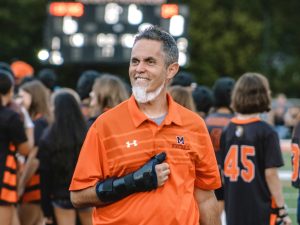Opinion: Online learning helps students with accommodations
Digital learning days are not ideal ways to learn, but they do help students who have IEPs and 504s
Though it has taken students time to get used to the corona-virus-inspired digital learning days, many students with special education accommodations have found flexibility and freedom by completing assignments online.
April 6, 2020
Waking up for school every day, the average student might be thinking about their presentation second period, or the test they have at the end of the day. However, the thoughts of an individual with a 504 or an Individualized Education Plan, a special education plan known as an IEP, can be quite different. This student might be thinking about their fear of having a panic attack before class, or if they will be able to sit through first period without getting overwhelmed. Now that classes are completed at home, e-learning makes the education process easier and more accommodating to most students with 504s and IEPs.
With a global pandemic underway, students have begun taking their classes completely online. The format of each class completely varies from Schoology assignments to class-wide video calls. Many students struggle to adjust to the change, resulting in a lot of negative feedback towards e-learning, however, some students actually thrive from the change from in-person to online.
Many 504 plans or IEPs provide students accommodations ranging anywhere from taking breaks in the new chill zone to being partially homebound by taking half of their classes online, half on campus. These accommodations are in place to put students on an equal playing field with everyone else, but not every student feels the equality in public that they feel online.
“When I was in school, I had so much anxiety no matter what, so I honestly felt like I could never learn anything when I was focused on how anxious I was,” explains West junior Mia Larsson, “I felt out of place when I would ask to leave because everyone would look at me but now nobody cares … It made me appreciate having online sources to help me.”
Advocating for oneself and using accommodations often brings unwanted attention. This can make it much harder for a student to reach out when they need help, however, it is a completely different scenario when taking classes online. Online, students are able to tailor their education to fit their needs.
Noah Koch, a junior attending West campus and participant in the partial homebound program, benefits heavily from e-learning, “It’s been easier to do my work at my own pace and take breaks when I need them,” he explains. “I’ve been able to do my work more spread out and not get overwhelmed.”
Many students need breaks in between learning or studying. Sure, almost all students have a lunch period and an AIM, but even those can be occupied by make-up tests and homework. Now that classes are online, students have the entire day at their disposal to break up what classes they do when, as long as they sign in by noon. Classes being online gives these students a sense of control and responsibility they struggle to have while in a public, structured setting.
With every new way of learning, there are always cons to take into consideration. West Senior Lexi Cox points out her concerns, “The information is more confusing, plus it’s harder to get help because you can’t walk up and ask.” This can be seen as both a con and a benefit depending on the individual. Some students struggle to speak to their teacher face-to-face but are more comfortable emailing. Now whenever they are lost on an assignment, they can shoot a teacher an email or even schedule a video call if they need help.
Overall, e-learning is very positive for students with 504 or IEP accommodations. These positives should be taken into consideration when providing options for these students. Times are definitely changing to a more online-dependent lifestyle, especially during a global pandemic, leading to new revolutionary ideas that help students that need it most.











